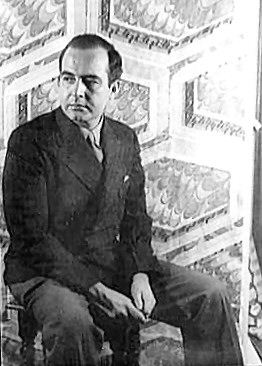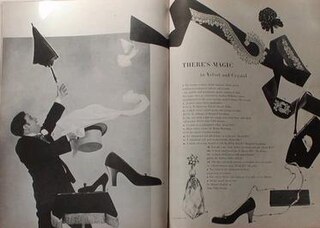Related Research Articles
Medium may refer to:

Joseph Arthur de Gobineau was a French aristocrat who is best known for helping introduce scientific race theory and "racial demography", and for developing the theory of the Aryan master race and Nordicism. Known to his contemporaries as a novelist, diplomat and travel writer, he was an elitist who, in the immediate aftermath of the Revolutions of 1848, wrote An Essay on the Inequality of the Human Races. In it he argued that aristocrats were superior to commoners and that aristocrats possessed more Aryan genetic traits because of less interbreeding with inferior races.

Vanessa is an American opera in three acts by Samuel Barber, opus 32, with an original English libretto by Gian Carlo Menotti. It was composed in 1956–1957 and was first performed at the Metropolitan Opera in New York City on January 15, 1958 under the baton of Dimitri Mitropoulos in a production designed by Cecil Beaton and directed by Menotti. Barber revised the opera in 1964, reducing the four acts to the three-act version most commonly performed today.

The Medium is a short (one-hour-long) two-act dramatic opera with words and music by Gian Carlo Menotti. Commissioned by the Alice M. Ditson Fund at Columbia University, its first performance was there on 8 May 1946, with Claramae Turner as Madame Flora. The opera's first professional production was presented on a double bill with Menotti's The Telephone at the Heckscher Theater, New York City, February 18–20, 1947 by the Ballet Society. The Broadway production took place on May 1, 1947, at the Ethel Barrymore Theater with the same cast.

The Old Maid and the Thief is a radio opera in one act by Italian-American composer Gian Carlo Menotti. The work uses an English language libretto by the composer which tells a twisted tale of morals and evil womanly power. Menotti writes in the libretto "The devil couldn't do what a woman can – Make a thief out of an honest man."

Amahl and the Night Visitors is an opera in one act by Gian Carlo Menotti with an original English libretto by the composer. It was commissioned by NBC and first performed by the NBC Opera Theatre on December 24, 1951, in New York City at NBC Studio 8H in Rockefeller Center, where it was broadcast live on television from that venue as the debut production of the Hallmark Hall of Fame. It was the first opera specifically composed for television in the United States.

Le pauvre matelot is a three-act opera composed by Darius Milhaud with libretto by Jean Cocteau. It was given its premiere on 16 December 1927 by the Opéra-Comique at the Salle Favart in Paris. Le pauvre matelot is short, lasting about 35 minutes when performed, and is dedicated to Henri Sauguet. The composer conducted a complete recording with forces of the Paris Opera in 1956. Although Cocteau claimed that the story was inspired by a news item in a paper, the scenario can be found in a 17th-century Franco-Canadian song 'Le Funeste Retour', and the tragedy Der vierundzwanzigste Februar by Werner of 1808.
Rosemary Kuhlmann was an American operatic mezzo-soprano and Broadway musical actress best known for originating the role of the Mother in Gian Carlo Menotti's Amahl and the Night Visitors, the first opera commissioned for television. Kuhlmann portrayed the role on the annual live NBC broadcast of the production from 1951 through 1962.
The Medium is a 1951 Italian drama film directed by Gian Carlo Menotti. It is based on the opera of the same name and was entered into the 1952 Cannes Film Festival. It would later be screened out of competition at the 1987 Cannes Film Festival.

Andrew McKinley was an American operatic tenor, violinist, arts administrator, music educator, and school administrator. Although he mainly performed in the United States, he had an active international singing career with major opera companies and symphony orchestras from the 1940s through the 1960s. His repertoire spanned a wide range, from leading tenor parts to character roles.

Help, Help, the Globolinks! is an opera in four scenes by Gian Carlo Menotti with an original English libretto by the composer. It was commissioned by the Hamburg State Opera and first performed as Hilfe, Hilfe, die Globolinks! in a German translation by Kurt Honolka on December 21, 1968, in a double bill with Menotti's Amahl and the Night Visitors. The opera had its English language premiere on August 1, 1969, in the United States at the Santa Fe Opera in a double bill with Igor Stravinsky's The Nightingale. Both premiere productions were directed by the composer. Many of the cast members from the Santa Fe production reprised their roles for the work's New York debut at the New York City Opera in December 1969.

Martin's Lie is a chamber opera in one act with music and an English language libretto by Gian Carlo Menotti. Commissioned by CBS, it was Menotti's third opera for television after Amahl and the Night Visitors and Labyrinth. Although not initially conceived as a work for the stage, the opera premiered in a live theatrical performance on 3 June 1964 at the Bristol Cathedral for the opening of the 17th annual Bath International Music Festival. The opera was subsequently filmed with the same cast for television under the direction of Kirk Browning with Julie Andrews serving as host. The production used sets and costumes by designer Anthony Powell, and was broadcast nationally by CBS for the opera's United States television premiere on 30 May 1965.
Rooted is a made-for-TV Australian film based on the play by Alex Buzo. It was produced for the Australian Broadcasting Corporation (ABC) and released in 1985.

Gian Carlo Menotti was an Italian-American composer, librettist, director, and playwright who is primarily known for his output of 25 operas. Although he often referred to himself as an American composer, he kept his Italian citizenship. One of the most frequently performed opera composers of the 20th century, he wrote his most successful works in the 1940s and 1950s. Highly influenced by Giacomo Puccini and Modest Mussorgsky, Menotti further developed the verismo tradition of opera in the post-World War II era. Rejecting atonality and the aesthetic of the Second Viennese School, Menotti's music is characterized by expressive lyricism which carefully sets language to natural rhythms in ways that highlight textual meaning and underscore dramatic intent.
Cavalleria Rusticana is a 1959 Australian television play, an adaptation of the opera by Pietro Mascagni. It was directed by Alan Burke.
Albert Herring is a 1959 Australian television play based on Benjamin Britten's opera of the same name. It was broadcast live from Melbourne in 1959 but recorded on tape and repeated in 1960. Leading tenor Victor Franklin had appeared as King Kaspar in a televised production of Menotti's Amahl and the Night Visitors in 1957. Christopher Muir produced and Clive Douglas conducted the Victorian Symphony Orchestra.
Alan Burke was an Australian writer and film director and producer. His credits include the musical Lola Montez.
Prima Donna is a 1959 television play broadcast by the Australian Broadcasting Corporation. It was an adaptation of an opera by Arthur Benjamin and was directed by Alan Burke. It was the first of several operas Burke would direct.

Gino Quilico is an American-Canadian operatic baritone.
Barbara Zechmeister is a German operatic soprano and voice teacher. A member of the Oper Frankfurt from 1996, she has appeared in major European opera houses and international festivals. She has performed in world premieres, and in recitals and recordings. Zechmeister has been a voice teacher at Dr. Hoch's Konservatorium since 2005.